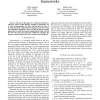Free Online Productivity Tools
i2Speak
i2Symbol
i2OCR
iTex2Img
iWeb2Print
iWeb2Shot
i2Type
iPdf2Split
iPdf2Merge
i2Bopomofo
i2Arabic
i2Style
i2Image
i2PDF
iLatex2Rtf
Sci2ools
142
click to vote
ICTAI
2010
IEEE
2010
IEEE
On the Role of Preferences in Argumentation Frameworks
The aim of this paper is to study how preferences, which are used to model intrinsic strengths of arguments, can be used in argumentation. We show that they play two roles: i) to repair the attack relation between arguments, and ii) to refine the evaluation of arguments. Then, we point out that the existing approaches for preference-based argumentation model only the first role. They may also return non conflict-free extensions. We propose a general framework that overcomes those limitations.
Argumentation | Artificial Intelligence | ICTAI 2010 | Non Conflict-free Extensions | Preference-based Argumentation Model |
Related Content
| Added | 13 Feb 2011 |
| Updated | 13 Feb 2011 |
| Type | Journal |
| Year | 2010 |
| Where | ICTAI |
| Authors | Leila Amgoud, Srdjan Vesic |
Comments (0)

